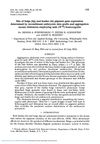Current hair regeneration methods show promise but face challenges in maintaining cell effectiveness and creating the right environment for hair growth.
 8 citations,
June 2021 in “International Journal of Molecular Sciences”
8 citations,
June 2021 in “International Journal of Molecular Sciences” Exosomes from umbilical cord cells fix hearing loss and damaged ear hair cells in mice.
 87 citations,
April 2018 in “Biochemical and Biophysical Research Communications”
87 citations,
April 2018 in “Biochemical and Biophysical Research Communications” Exosomes from dermal papilla cells can help grow hair and might treat hair loss.
March 2023 in “International Journal of Molecular Sciences” ADSC-Exos with miR-122-5p can help treat hair loss by promoting hair growth.
May 2024 in “International Journal of Molecular Sciences” Mouse hair follicle stem cells can help prevent Type 1 Diabetes.
 1 citations,
January 2024 in “Theranostics”
1 citations,
January 2024 in “Theranostics” Exosomes show promise for future tissue regeneration.
 1 citations,
October 2023 in “European journal of histochemistry”
1 citations,
October 2023 in “European journal of histochemistry” Ozone and procaine boost the release of healing factors in platelet-rich plasma.
 August 2019 in “Stem cells”
August 2019 in “Stem cells” New treatments for hair loss, fertility, and wound healing are being explored.
 July 2024 in “Clinical Cosmetic and Investigational Dermatology”
July 2024 in “Clinical Cosmetic and Investigational Dermatology” Exosomes can help promote hair growth and may treat hair loss.
 135 citations,
December 2015 in “Expert Opinion on Biological Therapy”
135 citations,
December 2015 in “Expert Opinion on Biological Therapy” Exosomes could potentially enhance tissue repair and regeneration with lower rejection risk and easier production than live cell therapies.
March 2024 in “Biomedicines” Mesenchymal stem cells show promise for effective skin repair and regeneration.
 25 citations,
December 2021 in “Stem Cell Research & Therapy”
25 citations,
December 2021 in “Stem Cell Research & Therapy” MSCs and their exosomes may speed up skin wound healing but need more research for consistent use.
63 citations,
September 2020 in “Frontiers in Microbiology” Probiotics show promise for health benefits but need more research to understand how they work.
 17 citations,
February 2019 in “PubMed”
17 citations,
February 2019 in “PubMed” Stem cells can help regenerate hair follicles.
 7 citations,
October 1985 in “Genetics Research”
7 citations,
October 1985 in “Genetics Research” Beige and leaden pigment genes act within melanocytes, affecting pigment patterns.
 5 citations,
April 2023 in “BMC Microbiology”
5 citations,
April 2023 in “BMC Microbiology” Shampoo with heat-killed Lacticaseibacillus paracasei GMNL-653 improves scalp health and hair growth by changing scalp bacteria.

Regenerative cosmetics can improve skin and hair by reducing wrinkles, healing wounds, and promoting hair growth.
 1 citations,
April 2023 in “Biomolecules”
1 citations,
April 2023 in “Biomolecules” Fermented papaya and mangosteen in hair care products helped prevent hair loss and improve hair thickness.
 13 citations,
February 2023 in “Aging”
13 citations,
February 2023 in “Aging” A substance from hair follicle stem cells helps heal skin wounds in diabetic mice by promoting cell growth and preventing cell death.
 10 citations,
March 2022 in “Communications biology”
10 citations,
March 2022 in “Communications biology” A new non-invasive method can analyze skin mRNA to understand skin diseases better.
 September 2023 in “Stem cell reviews and reports”
September 2023 in “Stem cell reviews and reports” Scientists found a new, less invasive way to get stem cells from horse hair for veterinary medicine.
 65 citations,
July 2020 in “Science Advances”
65 citations,
July 2020 in “Science Advances” Dermal exosomes with miR-218-5p boost hair growth by controlling β-catenin signaling.
 2 citations,
April 2021 in “bioRxiv (Cold Spring Harbor Laboratory)”
2 citations,
April 2021 in “bioRxiv (Cold Spring Harbor Laboratory)” The conclusion is that analyzing RNA from skin oils is a promising way to understand skin diseases.
Different genes and pathways are active in yak skin and hair cells, affecting hair growth and immune responses.
December 2022 in “Molecular Pharmaceutics” Latanoprost-loaded nanotransfersomes could help treat hair loss by promoting hair growth.
63 citations,
May 2015 in “PloS one” GALT5 and GALT2 are important for plant growth and development because they help with protein glycosylation.
1 citations,
December 2023 in “Life” PRP helps skin heal, possibly through special cells called telocytes.
6 citations,
August 2022 in “International journal of molecular sciences” α-Phellandrene may help prevent hair loss by increasing growth factors and cell growth in hair cells through a specific signaling pathway.
3 citations,
January 2021 in “Oxidative Medicine and Cellular Longevity” Nrf-2-modified stem cells from hair follicles significantly improve ulcerative colitis in rats.
 August 2023 in “International journal of medical science and clinical research studies”
August 2023 in “International journal of medical science and clinical research studies” PRP therapy helps heal pediatric surgical wounds faster and with fewer scars but needs more research for safety and cost.


















